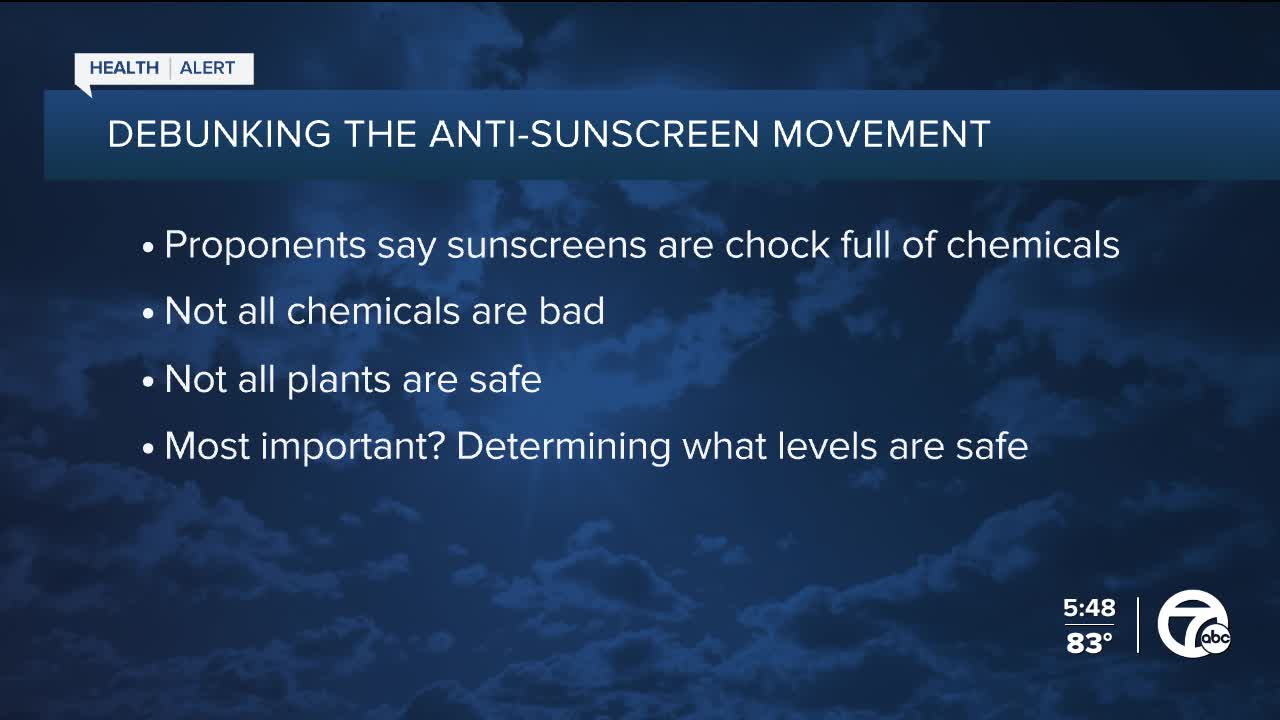(WXYZ) — In today’s Health Alert, there’s a concerning and potentially dangerous trend gaining traction on TikTok and other platforms. The anti-sunscreen movement is encouraging users to ditch sunscreen, promoting unverified claims about its alleged harms.
There is some pretty wild misinformation circulating online that needs to be addressed. To start, there is no substantial scientific evidence supporting the idea that sunscreen causes cancer.
Proponents of the anti-sunscreen movement say that sunscreens are chock full of chemicals. First of all, not all chemicals are bad, and secondly, not all plants are safe. For instance, water is a chemical, and cyanide can be found in certain plant foods. What's most important is determining what levels are safe for people to consume.
Now, when it comes to sunscreen, there are different types. Chemical-based sunscreens contain compounds like oxybenzone or avobenzone. These penetrate the skin, absorb UV radiation, and convert it into heat, which is then released from the skin. Mineral-based sunscreens contain zinc oxide or titanium dioxide. They sit on top of the skin, acting as a physical blocker and reflect or scatter UV radiation.
Protecting yourself from UV radiation is vital because it damages the DNA within the cells of your skin. And this can lead to mutations and increase the risk of skin cancer.
VIDEO: This Melanoma Monday, learn these common signs of skin cancer & how to protect yourself
Sunlight does boost Vitamin D production, but the risks of skipping sunscreen far outweigh the benefits. Extensive evidence points to the sun as the primary culprit behind skin cancer, with 80–90 percent of cases attributed to ultraviolet radiation exposure. So, to naturally boost your Vitamin D levels, eat foods rich in it, such as fatty fish, egg yolks, and fortified foods like milk and cereals. Additionally, Vitamin D supplements might help as well.
As for protecting yourself from the sun's harmful UV radiation:
- Limit your time in the sun, especially between 10 am and 4 pm when the sun’s rays are most intense. Seek shade under trees, umbrellas, or other structures.
- Wear sunglasses, a wide-brim hat, and lightweight clothes that cover your arms and legs. Consider clothing specifically designed to protect against UV radiation.
- Be mindful of reflective surfaces like water, sand, and concrete. These can increase UV exposure.
- When it comes to sunscreen, choose broad-spectrum products with an SPF of 30 or higher that protect against both UVA and UVB rays. Reapply every two hours or after swimming or sweating.
Remember, not everything you read or watch online is accurate, especially if the source isn't an expert. If you're unsure, consult your family doctor or a dermatologist for reliable information.



